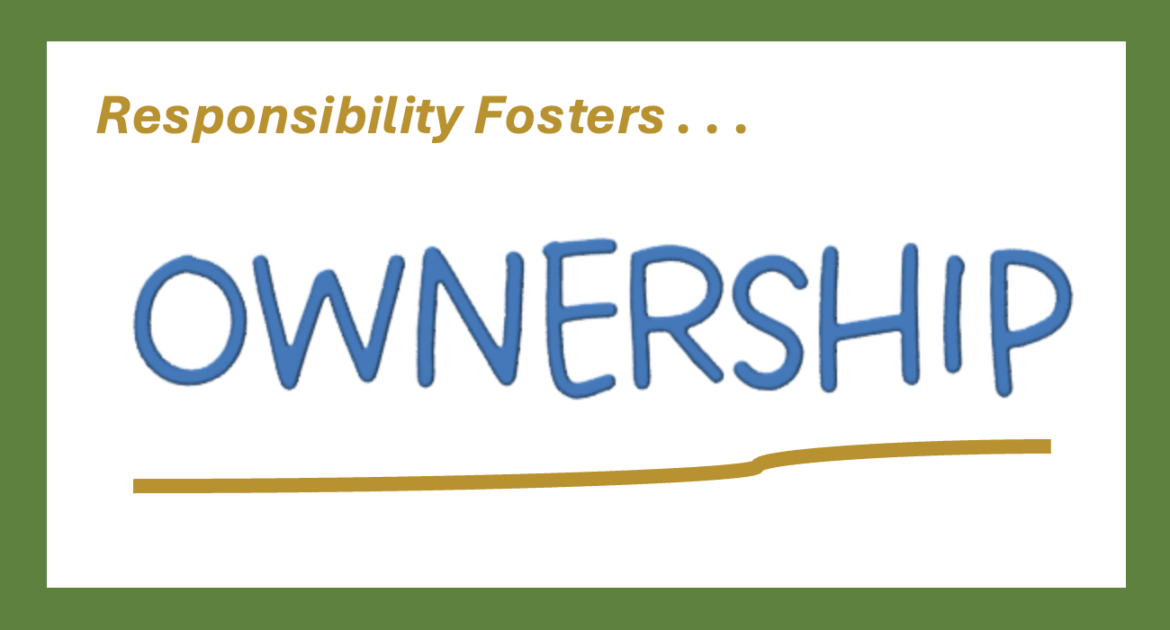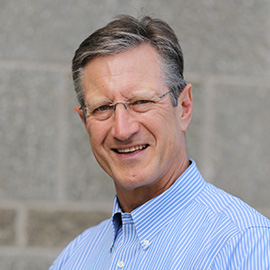Team Members Who Act Like Owners: Accountability vs. Responsibility

The COVID-19 pandemic opened our eyes and challenged us to reflect on our work life. While the pace of changing jobs has slowed, the questions many of us ask ourselves—What is the meaning of my work? Why am I working?—continue apace.
Each of us desires to be intrinsically invested in our work rather than accountable for delivering what somebody else wants.
To help leaders, we attempt to differentiate between accountability, the external force of what someone else wants, and responsibility, the intrinsic desire to own the outcome of our work.
Do you feel there is a difference?
Tapping into our Intrinsic Energy
We have written on intrinsic energy in the past, and recently, I came across a post in The Daily Coach, one of my favorite blogs, that shared another way to look at the same subject. It motivated me to share this critical concept for leaders again.
Early in my career, I had a wake-up call that changed the trajectory of our family’s life.
At age twenty-eight, I was working in New York City as a management consultant, and the client work was energizing. However, the commute from Connecticut, the constant travel, the lack of respect from my superiors, and the lack of trust in my peers were de-energizing.
My Wake-up Call
Our two-year-old son became seriously ill due to complications from the flu, and I spent four nights and five days at his bedside in the hospital. I did a lot of reflecting on my life and work, and I realized I was doing what others wanted done without them valuing my thoughts or ideas. I decided I was not going to do this anymore.
I was deeply grateful when our son fully recovered. A few months later, I was on the staff of Michigan Football, where I had been a player during my college years, working for Coach Bo Schembechler. Bo was a master at intrinsically energizing people, and the feeling was stunning. I went to work energized to work with people I trusted, knowing every day that I was valued and respected for what I could bring to the team. We each had the same growth mindset: On my own I am not as good as I could be, but together, we can become something special.
The Source of Our Intrinsic Energy?
Intrinsic energy may be the most important asset for helping leaders and organizations unleash their greatness—and it’s free. Great leaders teach team members to own the responsibility to execute their work at the highest level. These teams consistently beat their competition, even though they may have less talent and other resources, because they feel and act like owners who care.
Leaders who do not understand the power that comes from an individual feeling they have made a contribution may rely on accountability—“Do what I tell you to do.” Those who lead this way must continually motivate their team for sustainable success. “Those leaders cannot go home and eat dinner,” as David Marquet shares in Turn the Ship Around, “they must always be present to get the effort needed for success. It is up to the leader to provide the extrinsic energy that drives what they hope will become a success.”
Accountability Vs. Responsibility
From The Daily Coach Blog, July 15, 2024
During the early 1980s, NFL teams had small organizations and facilities. Inside the San Francisco 49ers’ two-floor facility in Redwood City, there was little room to handle a growing organization.
The first floor was for the players and had meeting rooms. The second was for the coaches and had business offices. Rooms were small, and everyone shared the space, making privacy obsolete.
Along the staircase walls to the second floor hung pictures of the recent 49er championships and achievements, of which there were plenty. Those frames needed to be perfectly aligned or head coach Bill Walsh would get upset. At his monthly meetings with the organization, Walsh used the alignment of the photos to explain the difference between accountability and responsibility.
Walsh in every meeting emphasized that he never wanted to see a picture out of place, (to this day, when I see a photo on the wall crooked, it makes me instantly straighten, regardless of my location) or not straight.
Walsh wasn’t an interior designer or a neat freak, rather a leadership guru who used the frames to build his winning culture. Walsh didn’t want to HAVE to tell people who saw a photo slanted to THEN fix it. If Walsh told you to fix the picture, then you became accountable.
Walsh wanted people to fix the frames on their own, without prompting. By fixing the frame without anyone saying anything, you assumed the responsibility of doing what he wanted. Walsh didn’t want accountability, he wanted responsibility.
When teams and organizations understand the difference, a total buy-in occurs. No one assumes blame, no one is assigned blame and bad outcomes don’t lay at the feet of a one person or department. Everyone shares in the success; everyone shares in the losses.
Some experts argue that an overemphasis on accountability in organizations can be counterproductive. Yves Morieux of BCG suggests that focusing too much on accountability creates conditions for failure rather than success, as it encourages a blame-oriented culture.
Instead, fostering a sense of responsibility and intrinsic motivation may lead to better outcomes. For a winning culture to exist, an organization needs to build responsibility rather than just accountability:
For any leader, teaching the difference between the two is the first step. The byproduct of making the organization understand the differences provides the following:
- Encourages ownership of outcomes, not just tasks
- Fosters psychological safety so people feel comfortable taking risks
- Focus on learning and improvement rather than blame when things go wrong
- Cultivates intrinsic motivation and a sense of shared purpose
By shifting from a narrow focus on accountability to a broader emphasis on responsibility, organizations can create an environment more conducive to success and innovation.
And all it takes for any leader is to explain the difference between the two. From that moment forward, those who straighten the pictures without a reminder are all in.
Those who don’t are not.
Our Fulfillment
When we feel responsible, fulfilling intrinsic energy comes into our lives. We accomplish because we want to, not because we have to. The effort is intrinsically deeply meaningful to us. For us to take responsibility, we must feel ownership. For us to feel ownership, it must feel like we are contributing to something meaningful. When we are connected to a meaningful purpose, we can take responsibility.
Definitions
Accountability – Doing something others have determined must be done the way they want it done. What, when, how, and by whom are defined by someone else. Accountability tends to be top-down.
Responsibility – Taking ownership of the deliverable that has been clearly outlined. Building upon suggested or past processes to deliver the desired results. Owning the process for the outcome. Intrinsic energy enables the best possible results with the least resources and tends to be bottom-up.






